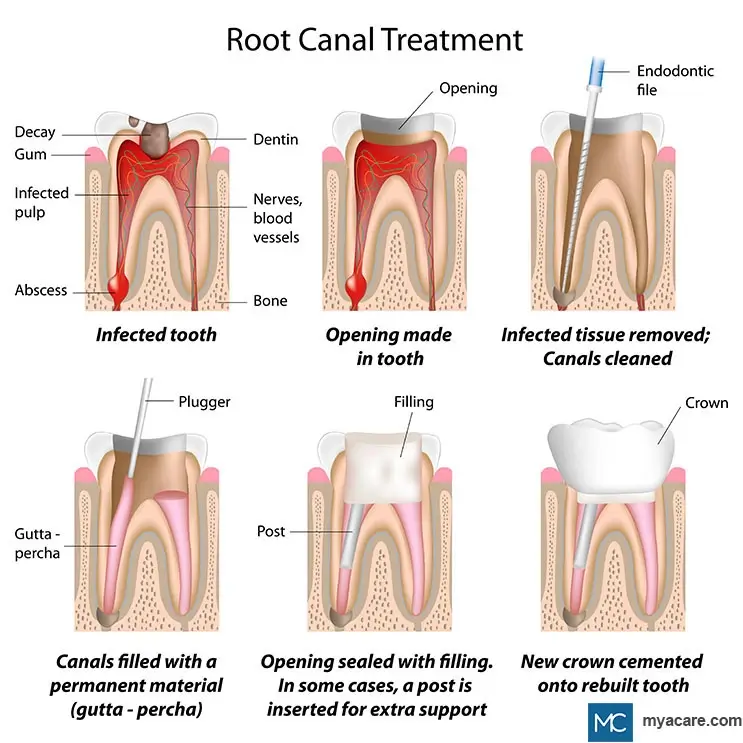When Should You Opt for a Root Canal Treatment, and What to Expect in the Procedure

Root canal treatment is the most common procedure performed to relieve tooth pain caused by presence of deep cavities. Cavities cause inflammation of the pulp (innermost layer of the tooth) and nerves present within the tooth, leading to pain. In root canal treatment, diseased or infected pulpal tissue is removed to prevent or stop the spread of infection to the roots of the tooth. The root canal treatment has a high success rate, with 85% success rate even after 10 years.
Root canal treatment is recommended when the infection cannot be treated with fillings or medications. If the root canal treatment is delayed and the decay spreads, the tooth becomes difficult to restore and is most likely to be extracted.
In this article, we discuss the root canal procedure and explain why saving the tooth with a root canal is better than extraction.
When Does an Individual Require a Root Canal Treatment?
Root canal treatment is required in the following conditions:
- Deep cavities involving the innermost layer of the tooth
- The presence of a deep crack or chipped off tooth
- Damage to the pulp due to external trauma or direct blow
- Discomfort due to dislodged fillings
What are the Symptoms for Root Canal Treatment?
Here are some of the symptoms:
- Severe tooth pain while chewing food
- Tooth pain that aggravates while lying down or bending
- Prolonged sensitivity after taking hot or cold food and beverages
- Discomfort due to the presence of a gum boil
- Change in the color of the tooth
- Experience of pain in the adjacent teeth, face, or jaws beside the affected tooth
What to Expect During the Root Canal Procedure?
Root canal procedure can be performed in a single or multiple sittings (2-3) by a general dentist or an endodontist. Each appointment may last for about 90 minutes or less.
The first sitting involves numbing of the tooth with the help of local anesthesia followed by isolation of the tooth to be treated from adjacent teeth with the help of a rubber dam (latex or nitrile sheets). Following this, an opening is created on the surface of the tooth using drills. Small, needle-like instruments are passed through the opening into the roots of the tooth and infected pulp is removed.
In the subsequent appointments, roots of the tooth are cleaned, disinfected, and filled with a filling material. The opening on the tooth is also sealed with a filling.
Once the treated tooth looks good both clinically and radiographically, it is restored with a crown to enhance its strength and function.

What to Expect After Root Canal Treatment?
An individual may experience soreness or mild pain in the treated tooth for 1-2 days post-treatment. The dentist will prescribe analgesics (pain killers) and antibiotics (if required) for 3-5 days. Intake of these medications will help reduce the discomfort. Individuals can resume their day-to-day activities from the same day of the treatment. In case of severe pain, swelling, or allergic reaction to medications, individuals should contact their dentist immediately.
What are the Post-Treatment Instructions to be Followed after a Root Canal Procedure?
Here are some of the post-treatment instructions to be followed after the treatment:
- Individuals tend to bite their cheeks or tongue more often while eating in a numbed mouth. Hence, eating should be avoided until the numbness wears off. Local anesthesia may take 30-60 mins to wear off
- The tooth tends to become brittle after the root canal treatment. So, biting or chewing of hard foods with the treated tooth should be avoided until it is restored with a crown
- Take medications as prescribed for better healing and to avoid post-treatment discomfort
- Maintain oral hygiene of the mouth with regular brushing and flossing. This helps to keep the treated site clean and prevent infections
- Avoid smoking after a root canal treatment as it increases the risk of treatment failure
- Visit the dentist regularly for follow-up appointments as directed
Why Root Canal Treatment Should be Preferred over the Extraction of the Tooth?
Here are some of the reasons to prefer root canal treatment over the extraction of tooth:
- Root canal treatment aids in the preservation of teeth. Preserving natural teeth is the best treatment option as no artificial tooth can replace the look and function of the natural tooth
- Root canal treatment is considered to be a highly predictable procedure to treat teeth with irreversible damage to the pulp of the tooth. In contrast, extraction of teeth results in loss of tooth which hampers the chewing efficiency of the individual
- The individual will require to undergo additional procedures such as a bridge or implants to restore the missing tooth. These additional procedures may impact the health of the adjacent teeth and gums
- Research suggests that chewing forces exerted by natural teeth are higher than the implants
- The cost and the effort involved in the root canal treatment are less than the extraction of teeth followed by replacement of missing tooth with dental implants.
- Extraction of the teeth creates gaps which compromise the function and aesthetics
However, some cases are difficult to treat with root canal procedure and may require extraction of teeth.
- If a patient waits too long to undergo a root canal, there may be irreparable loss of tooth structure
- Long-standing tooth infections may result in loss of tooth-supporting bone, leading to tooth loss
- A tooth with severe furcation involvement (bone loss between the root of teeth) has lower success rates with root canal procedures
- A severely fractured tooth is recommended for extraction
- A tooth with a crack below the gumline is difficult to restore and advised for extraction
- Teeth with root canal treatment failure due to procedural errors or lack of clinical expertise are also recommended for extraction
To search for the best dentists in Germany, India, Malaysia, Poland, Singapore, Spain, Thailand, Turkey, the UAE, the UK and the USA, please use the Mya Care search engine.
To search for the best healthcare providers worldwide, please use the Mya Care search engine.

Dr. Shilpy Bhandari is an experienced dental surgeon, with specialization in periodontics and implantology. She received her graduate and postgraduate education from Rajiv Gandhi University of Health Sciences in India. Besides her private practice, she enjoys writing on medical topics. She is also interested in evidence-based academic writing and has published several articles in international journals.
References:
Featured Blogs



